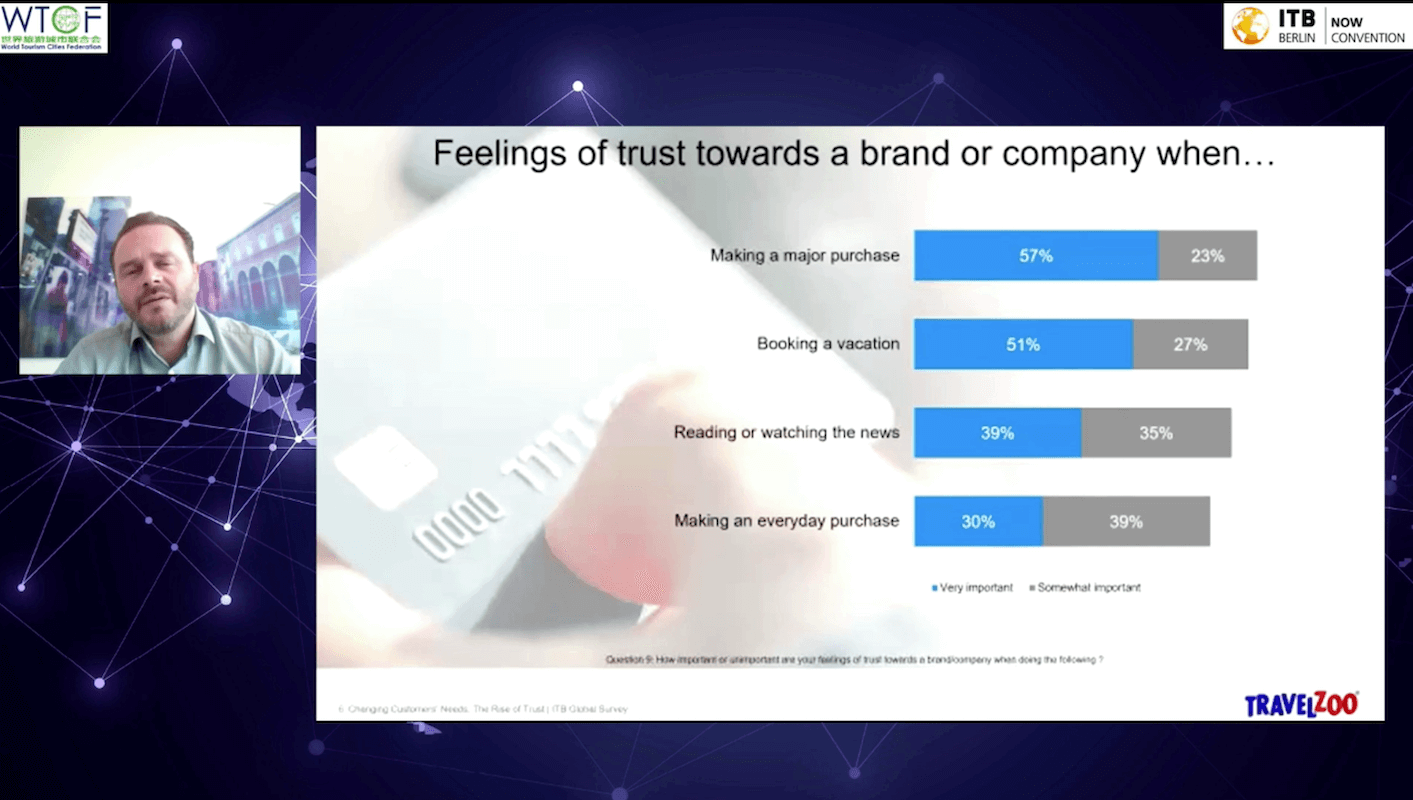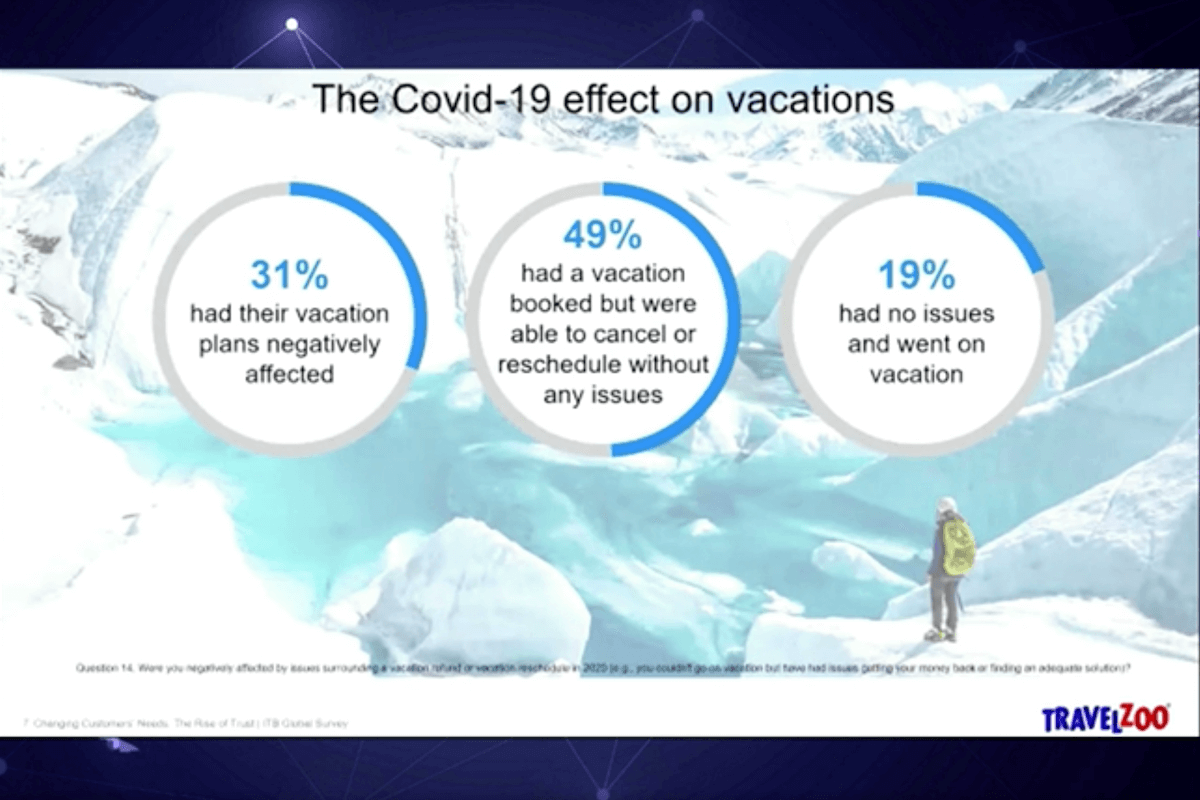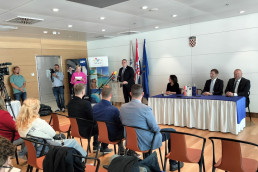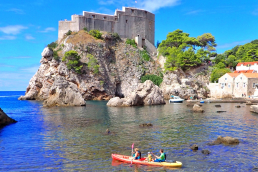The pandemic has undermined trust for travel companies. Flexibility is the way to recover it

Trust for travel companies is a key factor in your purchasing decision. During the pandemic, this confidence has fallen in some parts of the world – especially in European countries. An expert from Travelzoo talked about how to recover them during the ITB fair.
The „global currency” that directly influences customers’ decisions to buy services or products is trust. According to a survey conducted for ITB Berlin by the Travelzoo booking portal, 83 percent. of respondents agree that credibility is the most important quality that a brand or company can have. The results of the study were presented in a presentation that took place virtually at the trade fair in Berlin by Christian Smart from Travelzoo.
We trust airlines and hotel chains the most
The respondents from China attached the greatest importance to trust (approx. 95%), and slightly less, but at the level of the global average – Canadians and US citizens (83%). Respondents from European countries were below average: the British and Spaniards attach the greatest importance to credibility, and slightly less – the French and Germans (70%).
It is clear that not all age groups pay the same attention to the Trust Factor. As you might guess, the percentage of people for whom trust is important increases with age. Most of them are in the 55-64 age group (almost 60%), the smallest – in the group of 18-24 year-olds (less than 40%). In the 65+ group, the percentage of such people is, however, slightly lower than among people aged 55-64.
By conducting the research, Travelzoo experts checked which business segments inspire the greatest trust among people. The top five consisted of: banks and financial institutions, charities and non-profit organizations, private health care institutions, retail brands known from the city’s main streets and restaurants.
In tourism, the top five are (sequentially): airlines, hotel chains, rail carriers, travel agencies and online holiday portals.
Holidays hit by a pandemic
The importance of trust in the purchasing process is not always the same – it matters most when a customer is considering spending more. When buying a holiday trip, the trust factor in the company is important for 51 percent. consumers, and for 27 percent. – somewhat important. For comparison, during everyday shopping, it is 30 and 39 percent, respectively.
Travelzoo investigated the impact of the pandemic crisis on trust in travel brands. First, it was checked how it influenced the implementation of vacation plans. Only 19 percent. respondents did not encounter any difficulties and went on vacation. 49 percent they had paid their reservations and they were able to postpone or cancel their trip without problems. On vacation plans, 31 percent. on the other hand, the crisis had a negative impact.
Where has confidence in travel companies dropped?
How did this affect trust in tourism companies? On a global level – a quarter trust them more, 20 percent. less, and 55 percent. – at the same level as before the pandemic.
However, the situation is different in different parts of the world. In the US, for example, as much as 47 percent. of respondents trusted tourism companies more, and 8 percent. – lost confidence. It is similar in China – 49 percent. increase, 12 percent decline in confidence. However, consumers in European countries reacted quite differently. In major markets, confidence has declined more than it has risen. In Great Britain – 18 percent increase, 24 percent decline, in Germany – 17 percent. up to 24 percent, in France – 16 percent up to 21 percent, and in Spain – 19 percent each. decline and growth.
“Why do people in Europe trust less tourism companies? Certainly it has to do with how the lockdown was going and with some chaos that came with it. The uncertainty as to how the situation would develop persisted for a long time, large companies did not give their clients money for a long time, and they also failed to cope with the rapidly increasing number of inquiries and complaints. There were also clear differences between European countries in how governments made decisions and how prepayment refunds proceeded, ”explained Christian Smart.
How to regain trust?
So what do people need to re-trust and feel that the purchase is safe for them? The survey shows that customers prioritize flexibility in postponing the trip or recovering money in the event of cancellation. On the second – sanitary safety, both during the trip and at the destination. The fourth important factor is the tests – carrying them out before departure increases the feeling of safety for passengers. It is equally important to generally ensure that it is safe to travel to your destination. The respondents also indicated that their confidence and level of safety are influenced by testing for the presence of SARS-COV also after arrival – e.g. at a hotel. Some of them also pay attention to vaccinations.
Travelzoo also checked whether customers are ready to bear the additional costs of increasing the level of security. On a global level, 75 percent. people have declared that they are willing to pay more for the services provided by the company they trust.
Again, the Chinese (95%) are in the lead in this respect, the Americans and Spaniards are at the level of the world average, and slightly below it: the French, Germans, British and Canadians.
Who =has influence on decisions?
Who do we trust when making a purchasing decision? Travelzoo has checked which sources of information are most important to us when making booking decisions. 32 percent each of the respondents indicated both official sources as well as opinions of their friends and families. 25 percent trusts in reviews available on online platforms, and 18 percent – consumer organizations, as well as press and television. A factor significant for as much as 39 percent. of respondents is purchase protection guaranteed by an industry organization such as the British ABTA.
“Overall, customers are loyal to a brand they trust and are willing to pay for security. Tourism brands must now show that they can be trusted. The way to achieve this goal is flexibility in the approach to changes in bookings, ”summarized Christian Smart.
POWIĄZANE WPISY
25 listopada 2024
Filoksenia w nowoczesnym wydaniu – rozmowa z Costasem Giakoumis, dyrektorem handlowym sieci Atrium Hotels and Resorts
Od marzeń o idealnym obiekcie po sieć luksusowych hoteli na Rodos – Atrium Hotels and…
0 Komentarzy5 Minuty
23 lipca 2024
Druskienniki i Birsztany – litewskie uzdrowiska na wyciągnięcie ręki
O uzdrowisku w Druskiennikach słyszał niemal każdy. Coraz większym zainteresowaniem…
0 Komentarzy4 Minuty
27 czerwca 2024
Bogata oferta turystyki silver na Mazowszu
Wiek to jedynie stan umysłu. A skoro tak, to nic nie stoi na przeszkodzie, by skorzystać…
0 Komentarzy10 Minuty
20 czerwca 2024
Wianki nad Wisłą – otwarcie sezonu turystycznego na Mazowszu
Już 22 czerwca na warszawskim Podzamczu odbędą się kolejne, uwielbiane przez mieszkańców…
0 Komentarzy2 Minuty
23 kwietnia 2024
Otwarcie sezonu turystycznego w Chorwacji
180 polskich touroperatorów, agentów turystycznych, ekspertów z branży i dziennikarzy…
0 Komentarzy3 Minuty
17 marca 2025
Chorwacja zaprasza do Dubrownika
Chorwacja zaprasza do zwiedzenia Dubrownika i okolic. W sezonie mamy tam bezpośrednie…
0 Komentarzy2 Minuty
6 lutego 2025
Samnaun w Silvretta Arena – wolnocłowe narty
Bombonierkowa miejscowość u stóp jednego z największych regionów narciarskich to…
0 Komentarzy7 Minuty
6 lutego 2025
Salzburger Sportwelt – region z pięcioma gwiazdami
Jeden z najciekawszych regionów w Austrii rzuca narciarzom wyzwanie – zdobądź 12 szczytów…
0 Komentarzy10 Minuty
13 stycznia 2025
Rekordowa suma zebrana podczas IV Gali Waszej Turystyki – ponad 243 tys. zł na Dom Dziecka w Kłodzku
IV Gala Waszej Turystyki zakończyła się sukcesem, jakiego jeszcze nie było – rekordowe…
0 Komentarzy2 Minuty
25 listopada 2024
Filoksenia w nowoczesnym wydaniu – rozmowa z Costasem Giakoumis, dyrektorem handlowym sieci Atrium Hotels and Resorts
Od marzeń o idealnym obiekcie po sieć luksusowych hoteli na Rodos – Atrium Hotels and…
0 Komentarzy5 Minuty
23 lipca 2024
Druskienniki i Birsztany – litewskie uzdrowiska na wyciągnięcie ręki
O uzdrowisku w Druskiennikach słyszał niemal każdy. Coraz większym zainteresowaniem…
0 Komentarzy4 Minuty
27 czerwca 2024
Bogata oferta turystyki silver na Mazowszu
Wiek to jedynie stan umysłu. A skoro tak, to nic nie stoi na przeszkodzie, by skorzystać…
0 Komentarzy10 Minuty
20 czerwca 2024
Wianki nad Wisłą – otwarcie sezonu turystycznego na Mazowszu
Już 22 czerwca na warszawskim Podzamczu odbędą się kolejne, uwielbiane przez mieszkańców…
0 Komentarzy2 Minuty
23 kwietnia 2024
Otwarcie sezonu turystycznego w Chorwacji
180 polskich touroperatorów, agentów turystycznych, ekspertów z branży i dziennikarzy…
0 Komentarzy3 Minuty
17 marca 2025
Chorwacja zaprasza do Dubrownika
Chorwacja zaprasza do zwiedzenia Dubrownika i okolic. W sezonie mamy tam bezpośrednie…
0 Komentarzy2 Minuty
6 lutego 2025
Samnaun w Silvretta Arena – wolnocłowe narty
Bombonierkowa miejscowość u stóp jednego z największych regionów narciarskich to…
0 Komentarzy7 Minuty
6 lutego 2025
Salzburger Sportwelt – region z pięcioma gwiazdami
Jeden z najciekawszych regionów w Austrii rzuca narciarzom wyzwanie – zdobądź 12 szczytów…
0 Komentarzy10 Minuty
13 stycznia 2025
Rekordowa suma zebrana podczas IV Gali Waszej Turystyki – ponad 243 tys. zł na Dom Dziecka w Kłodzku
IV Gala Waszej Turystyki zakończyła się sukcesem, jakiego jeszcze nie było – rekordowe…
0 Komentarzy2 Minuty
25 listopada 2024
Filoksenia w nowoczesnym wydaniu – rozmowa z Costasem Giakoumis, dyrektorem handlowym sieci Atrium Hotels and Resorts
Od marzeń o idealnym obiekcie po sieć luksusowych hoteli na Rodos – Atrium Hotels and…
0 Komentarzy5 Minuty











